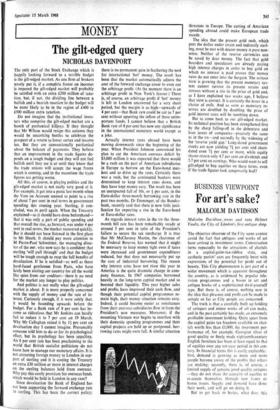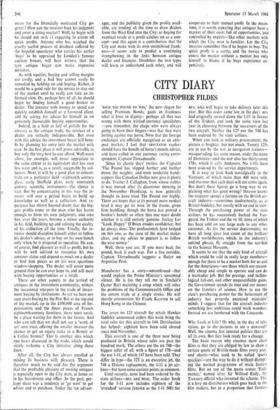For art's sake?
BUSINESS VIEWPOINT MALCOLM DAVIDSON
Malcolm Davidson ;Owns and runs Helmet Vaults, the City of LOndon's first antique shop.
The objective observer of the City scene cannot avoid the fact that antiques and works of art have arrived in investment terms. Conversation turns repeatedly to the attractions of chattels in a capital-gains-tax-ridden state, and aesthetic purists' ears are frequently beset with expressions of the potential for profit out of beauty. This City phenomenon is just part of a wider movement which is apparent throughout the country, as is evidenced by popular tele- vision programmes and a boom in art and antique books of a sophisticated do-it-yourself type. But there is, of course, nothing new in the idea that pleasure and profit can be made to mingle so far as City people are concerned.
The truth is that a carefully built up holding of antiques and minor works of art can make, and in the past certainly has made, an extremely profitable investment holding. Quite apart from the capital gains tax freedom available on chat- tels worth less than £1,000, the investment per- formance of, for example. Georgian silver of good quality or finely made eighteenth-century English furniture has been at least equal to that of equities over any ten-year period in this cen- tury. In financial terms this is easily explicable: first, demand is growing as more and more people become aware of the profits that others are making; secondly, there is, of course, a limited supply of genuine good quality antiques —they do not share the capacity of equities to re-create themselves through new issues or bonus issues. Supply and demand have done their work, and will go on doing it.
But to get back to basics, what does this mean for the financially motivated City go- getter? How can the investor back his judgment and enter a rising market? Well, to begin with he should not rush in expecting to cream off quick profits. Anyone who has watched the cruelly tactful process of disabuse suffered by the hopeful speculator who carries his earlier `buys' to be appraised by London's famous auction houses, will bear witness that the tyro antique buyer can make expensive mistakes.
As with equities, buying and selling margins are costly, and a bad buy cannot easily be remedied by holding on and hoping. Rather, it would be a good rule for the novice to stay out of the market until he really can take an in- formed view. Or, perhaps best of all, he should begin by finding himself a good broker or dealer. The investor with money to spend can quickly establish himself as a favoured client, and by asking for advice let himself in on genuinely favourable buying opportunities.
Indeed, in a field as full of pitfalls for the unwary as the antique trade, the services of a dealer are virtually indispensable. But even with this advice, the investment buyer will bene- fit by planning his entry into the market with care. In the first place it will prove advisable to buy only the very best he can afford. Well-worn silver, for example, will never appreciate to the same extent as its equivalent that has seen less wear and is, as a result, acceptable by col- lectors. Next, it will be a good plan to concen- trate on a particular field—eighteenth century glass, early Sheffield plate, early nineteenth century scientific instruments—the choice is vast. But by concentrating in this way the in- vestor will over a period begin to build up knowledge as well as a collection. And ex- perience has shown beyond doubt that the big- gest profits come to the man who has learnt enough to form his own judgments, and who has, over the years, become a minor authority in his field, building up and refining the quality of his collection all the time. Finally, the in- vestor should discipline himself either to follow his dealer's advice, or to buy on his own hunch only when he is prepared to speculate. He can, of course, find pleasure as well as profit, but he will be well advised to recognise his own amateur status and depend as much on a dealer to find him pieces as on his own sparetime window-shopping. The dealer will cover more ground than he can ever hope to, and will meet with buying opportunities as a result.
There are other aspects to the arrival of antiques in the investment community, witness the occasional whispers in the trade of invest- ment buying by institutions. As yet we have not seen overt buying by the Pru. But at the top end of the market, up in the £100,000 area of Im- pressionists and the finest pieces of French eighteenth-century furniture, there must surely be a place waiting for them in the future. And who can tell that we shall not see a 'work of art' unit trust, offering the smaller investor the chance to get an equity stake in a Renoir or a Cellini bronze? This is another idea which one hears discussed in the trade, which would surely welcome a City initiative along these lines.
After all, the City has always excelled at mixing its business with pleasure. There is therefore much to be said for the argument that the profitable pleasure of owning antiques is especially open to the City man, at home or in his boardroom and office. In the past, per- haps there was a tendency to `go west' to get advice and to purchase. Today the tax advant- ages, and the publicity given the profits avail- able, are tending all the time to draw dealers from the West End into the City; as buying for eventual resale at a profit catches on as a con- cept—and this again is a contribution that the City can make with its own uninhibited frank- ness—it seems safe to predict a continuing strengthening in the links between antique dealer and financier. Doubtless the two types will learn to understand each other, and will cooperate to their mutual profit. In the mean- time, it is worth repeating that antiques have a market of their own; full of opportunities, and controlled by experts—like other markets with which the City man is familiar. Let the City investor remember this if he begins to buy. The , quick profit is a rarity, and the novice who enters the market without a mentor has only himself to blame if he buys experience ex- pensively.











































 Previous page
Previous page